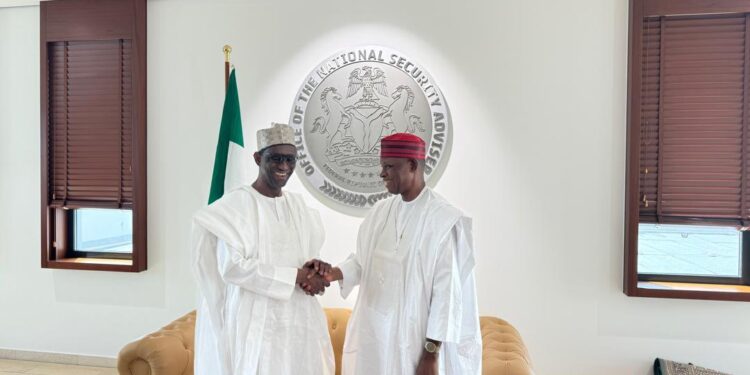Kano State Governor, Abba Yusuf, engaged in a pivotal meeting with the National Security Adviser, Malam Nuhu Ribadu, at the Office of the NSA in Abuja on Thursday. The extensive discussion, spanning over an hour, was instigated by recent tumultuous events in Kano, particularly following the dissolution of five emirates by the state House of Assembly and the subsequent restoration of Muhammad Sanusi as the Emir of Kano.
Amidst this backdrop, Emir Sanusi demonstrated continuity in his leadership by appointing Hamisu Sani as the new Ward Head for Kofar Mazugal, Dala Local Government area of the state. Sanusi, in his directive to the new ward head, emphasized the paramount importance of fostering peaceful coexistence among subjects and contributing to the overall development of the state.
Despite the emirate crisis, prominent figures including district heads and delegations from religious and market bodies continued to show allegiance to Sanusi, sidelining the deposed Emir Ado Bayero. This display of support extended from the Ansarulddeen Tijjanniya sect to traders from renowned markets like Kantin Kwari and Singer markets in Kano.
However, amidst the turmoil, accusations emerged against Ribadu regarding his alleged role in facilitating the return of the deposed Emir Ado Bayero to the palace. Deputy Governor Aminu Gwarzo initially implicated Ribadu but later retracted the claim, citing flawed intelligence.
The Governor’s spokesperson, Dawakin Tofa, affirmed the state’s retraction of the allegation against Ribadu and extended a sincere apology. Tofa also highlighted the constructive meeting between the Governor and the NSA, focusing on state and national development issues and the imperative of maintaining peaceful coexistence.
Meanwhile, the city of Kano experienced a resurgence of calm as Sanusi’s six-day stay at the palace unfolded, with district heads and key figures reaffirming their allegiance to the Emir. Notable personalities such as Khalifa Sayyadi Bashir and Sheikh Ibrahim Shehu Maihula endorsed Sanusi’s leadership.
As tranquility returned to Kano, residents resumed their daily activities, expressing confidence in the state’s leadership to resolve the emirate crisis amicably. Despite security presence at strategic locations, residents remained undisturbed, prioritizing livelihood concerns over the emirate tussle.
The atmosphere around the emir’s palace buzzed with activity, characterized by traditional displays, cultural performances, and bustling market stalls. Visitors from across the country flocked to witness royal ceremonies and pay homage to the reinstated Emir Sanusi, reflecting the enduring cultural significance of the Kano Emirate.
























